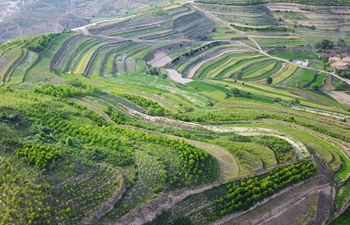CANBERRA, June 26 (Xinhua) -- Researchers in Australia believe they have made a breakthrough in the development of drought-resistant crops, after they were able to "close the pores" on the leaves of different plants to naturally conserve water in times of drought.
The breakthrough was made by a research team led by the Australian National University (ANU), and could one day ensure that vital food crops such as wheat, barley and rice can survive 50 percent longer in times of drought.
In a statement on Monday, Dr Barry Pogson from the ANU said the team was able to identify a molecular pathway which controls a plant's ability to close its pores, a process which naturally conserves water.
"This basic scientific research has the potential to be able to improve farming productivity not just in Australia, but potentially in other countries that suffer from drought stress," Pogson said.
"If we can even alleviate drought stress a little it would have a significant impact on our farmers and the economy."
The team was able to use a chloroplast signal to stimulate a plant's cells and close the pores, in a finding described as "completely unexpected."
Co-researcher, Dr Kai Chan said the team tested the theory on barley, and found that enhancing the chloroplast signal on the cells, the barley survived in drought conditions 50 percent longer.
"Boosting the levels of this chloroplast signal also restores tolerance in drought-sensitive plants and extended their drought survival by about 50 percent," Chan said on Monday.
The research was conducted with the help of the University of Adelaide, University of Western Sydney, the Commonwealth Scientific and Industrial Research Organisation (CSIRO), Kasertsart University in Thailand and the University of California San Diego.

















